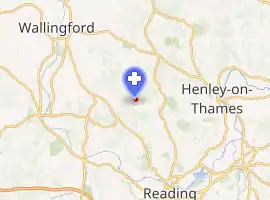Wyfold Court
Wyfold Court is a country house at Rotherfield Peppard in south Oxfordshire. It is a Grade II* listed building.[1] By the year 2000, the estate had been converted into apartments.[2]
| Wyfold Court | |
|---|---|
_-_geograph.org.uk_-_727725.jpg.webp) Wyfold Court | |

| |
 Shown in Oxfordshire | |
| Geography | |
| Location | Rotherfield Peppard, Oxfordshire, England |
| Coordinates | 51.5359°N 1.0188°W |
| Organisation | |
| Care system | National Health Service |
| Funding | Public hospital |
| Type | Mental health |
| History | |
| Opened | 1932 |
| Closed | 1993 |
History
The house was designed by George Somers Leigh Clarke for the Lancashire cotton magnate and Conservative politician Edward Hermon and was built between 1874 and 1884.[1]
Wyfold Court has a 14 window range of non-uniform material, mostly of stone mullion and transom windows with "elaborate carved hoods".[1] The building is built of scarlet brick with blue brick diapers (geometric patterns) and yellow stone details.[3] Its style combines the Flamboyant period of French Gothic architecture with a touch of Scots Baronial.[3] The front façade has towers with corner turrets, gargoyles and traceried windows; its garden front has mullioned bay windows and brick gable (facing roof walls) with crocketed heraldic beasts.[3] Indoors, the main corridor is rib vaulted with staircase hall and a multi-storey wide bay window with stained glass of royal coats of arms.[3] In the 1970s critic Jennifer Sherwood summarised its architecture as a "Nightmare Abbey".[3]
Hermon's only daughter was Frances Caroline Hermon who married Robert Hodge. Hodge secured a seat in the Commons at the 1895 general election as MP for the Southern or Henley Division of Oxfordshire.[4] He was created a baronet as Sir Robert Hodge of Wyfold Court in July 1902[5] and later ennobled as Baron Wyfold in May 1919.[6]
After his wife died in 1929, Hodge had little use for such a large house and, in 1932, he sold it to the Government who converted it for medical use as Borocourt Hospital.[1] It joined the National Health Service in 1948.[7] In 1981 Silent Minority, a documentary film made by Nigel Evans for ATV, highlighted the conditions of mental patients at the Borocourt Hospital and at St Lawrence's Hospital in Caterham.[8]
After the introduction of Care in the Community in the 1980s the hospital reduced in size and closed in 1993.[7] By the year 2000, it was returned to residential use as apartments.[9]
References
- Historic England. "Borocourt Hospital (1180805)". National Heritage List for England. Retrieved 18 June 2015.
- Six magnificent apartments for sale in stately homes across Britain 28 March 2020
- Sherwood & Pevsner 1974, p. 738.
- "New Members of Parliament". The Times. 29 July 1895. p. 13.
- "No. 27457". The London Gazette. 25 July 1902. p. 4738.
- "Baron Wyfold". Cracrofts Peerage. Retrieved 5 October 2018.
- "Borocourt Hospital, Reading". National Archives. Retrieved 5 October 2018.
- "Deception row over hospital TV film". Glasgow Herald. 10 June 1981. Retrieved 17 June 2011.
- "Wyfold Court". Britannia. Retrieved 5 October 2018.
Sources
- Sherwood, Jennifer; Pevsner, Nikolaus (1974). Oxfordshire. The Buildings of England. Rotherfield Peppard: Penguin Books. pp. 737–738. ISBN 0-14-071045-0.